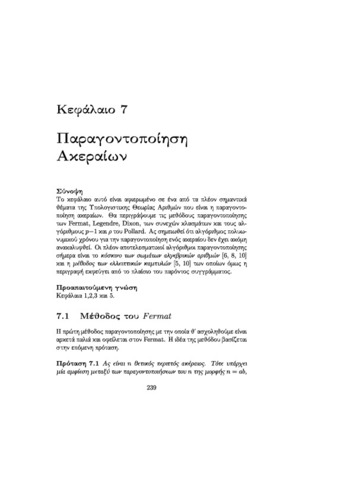| Title Details: | |
|
Ιnteger Factorization |
|
| Authors: |
Poulakis, Dimitrios |
| Reviewer: |
Tzanakis, Nikolaos |
| Subject: | MATHEMATICS AND COMPUTER SCIENCE > MATHEMATICS > NUMBER THEORY MATHEMATICS AND COMPUTER SCIENCE > MATHEMATICS > NUMBER THEORY > COMPUTATIONAL NUMBER THEORY MATHEMATICS AND COMPUTER SCIENCE > COMPUTER SCIENCE MATHEMATICS AND COMPUTER SCIENCE > COMPUTER SCIENCE > ALGORITHMS AND COMPLEXITY MATHEMATICS AND COMPUTER SCIENCE > COMPUTER SCIENCE > INFORMATION ASSURANCE AND SECURITY > CRYPTOGRAPHY |
| Keywords: |
Computational Number Theory
Integer Factorization Cryptograpy |
| Description: | |
| Abstract: |
This chapter is devoted to one of the most important topics of the Computational Number Theory which is the integer factorization. We shall describe the methods of Fermat, Legendre, Dixon, Continuous Fractions and the algorithms p-1 and ρ of Pollard. Note that polynomial time algorithm for the integer factorization is not invented yet. The most effective integer factorization algorithms are the Number Field Sieve and the method of Elliptic Curves but the development of the necessary mathematical tools for their presentation is not in the aims of this book.
|
| Table of Contents: |
Chapter 7 contains the following sections:
7.1 Fermat's method 7.2 Factorization Bases 7.2.1 Legendre's method 7.2.2 Dixon's algorithm 7.2.3 Factorization with continuous fractions 7.3 Algorithm p − 1 of P ollard 7.4 Αlgorithm ρ of Pollard 7.5 Exercises Bibliography |
| Technical Editors: |
Karakostas, Anastasios |
| Type: |
Chapter |
| Creation Date: | 2015 |
| Item Details: | |
| License: |
http://creativecommons.org/licenses/by-nc-nd/3.0/gr |
| Handle | http://hdl.handle.net/11419/1050 |
| Bibliographic Reference: | Poulakis, D. (2015). Ιnteger Factorization [Chapter]. In Poulakis, D. 2015. Computational Number Theory [Undergraduate textbook]. Kallipos, Open Academic Editions. https://hdl.handle.net/11419/1050 |
| Language: |
Greek |
| Is Part of: |
Computational Number Theory |
| Number of pages |
23 |
| Publication Origin: |
Kallipos, Open Academic Editions |


